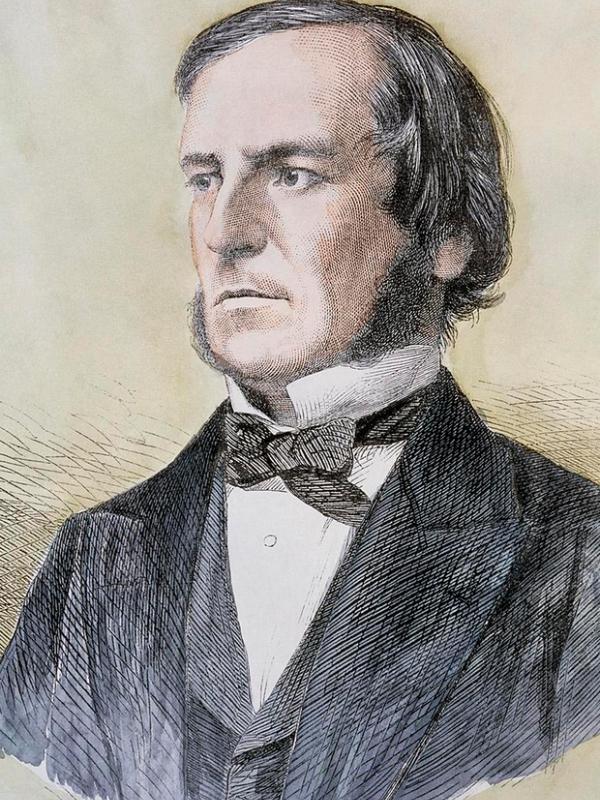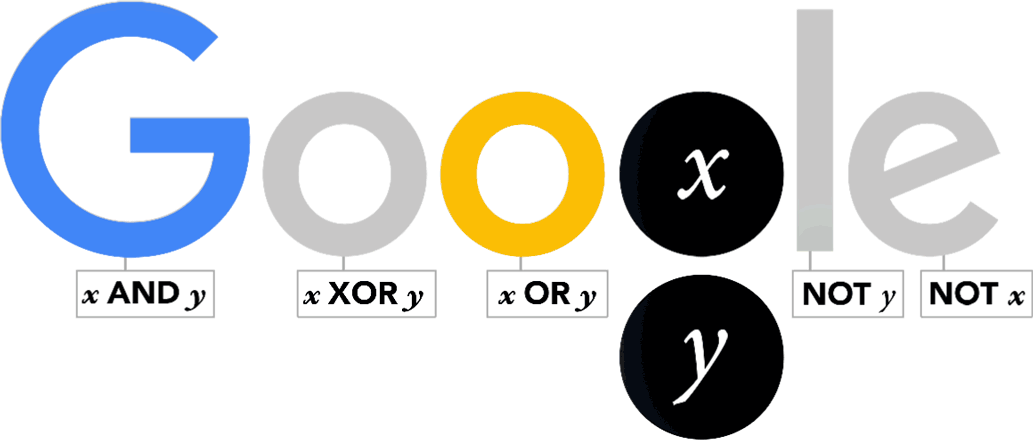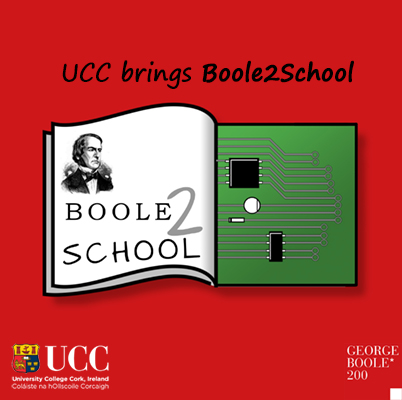George Boole, 1864/165
University College Cork is organizing the big event George Boole 200. A year-long celebration of the life and legacy of George Boole. In preparing for the celebrations we are working closely with Cork City Council and the University of Lincoln.
- Google Doodle:
Google doodle George Boole's 200th anniversary
Google celebrates George Boole’s 200th birthday with an interactive Doodle. His legacy of "Boolean algebra" laid the foundations of digital age. His logical theory acts as the basis of modern digital computer and other electronic devices. From this point of view, he is considered as one of the founders of computer science
George Boole was an English mathematician, philosopher and logician. He worked in the fields of differential equations and algebraic logic, and is best known as the author of The Laws of Thought.
It shows the search engine's colourful sign in action with a demonstration of the logic gates used in computing that are derived from Boolean functions.
So when the "x" and "y" of the second "g" in Google light up, they activate the other letters depending on the logic gates beneath them.
When both are activated, the first "G" lights up because the logic gate states "x AND y".
But when neither are showing, the "l" and "e" at the end of Google light up because their logic gates are "NOT y" and "NOT x" respectively.
The Mathematical Analysis of Logic
by George Boole
via Stephen Wolfram
Looking at Boole’s book today, much of it is quite easy to understand. Here, for example, is him showing how his algebraic formulation reproduces a few standard results in logic:
Boole : Algebraic Logic Formulations
So, as we can see, the theory can be used both for input when dealing with software and the behind-the-scenes coding that allows computers to run different commands depending on the user's actions.
Many of us his works were primarily in the fields of differential equations, probability and algebraic logic.
His lasting theory, Boolean logic, is a form of algebra where all the values (or variables) are either "true" or "false".
George Boole, 1860
- Some biographical notes:
George Boole the inventor of "Boolean logic" was born on 2 November 1815. Spurred on by a mystic experience - Boole was a philosopher - in which God called him to explain how the mind processes thought. He decided to do this in a mathematical form and all for the Glory of God.
Boole become a renowned mathematician, logician and philosopher (despite no formal schooling) and his work served as the basis for modern computer science.
George Boole’s great achievement was to show how to bring them together, through the concept of what’s now called Boolean algebra. And in doing so he effectively created the field of mathematical logic, and set the stage for the long series of developments that led for example to universal computation.
Stephen Wolfram
George Boole 200, a University of College Cork website dedicated to him, says Boole “invented a new kind of mathematics by classifying thought and codifying it using algebraic language.”
Many of us his works were primarily in the fields of differential equations, probability and algebraic logic.
Boole become a renowned mathematician, logician and philosopher (despite no formal schooling) and his work served as the basis for modern computer science.
And, had he lived, he would have seen the amazing influence of his mathematical work on today's computer-reliant society.
George Boole, work
George Boole, work
His lasting theory, Boolean logic, is a form of algebra where all the values (or variables) are either "true" or "false".
In the 1930's, Boolean Algebra was applied to the first electrical circuits that would one day become our modern computers.
Boole first produced his binary logic in Lincoln, where he lived most of his life. It was set out in The Mathematical Analysis of Logic, published in 1847.
Bust of Boole at University College of York
In 1855, Boole was awarded the Keith Medal by the Royal Society of Edinburgh. Two years later, he was elected as Fellow to the prestigious Royal Society of London.
Boolean Logic was to become the basis of modern computing and he is also thought of as the founder of the field of computer science.
Boole was one of the early thinkers of artificial intelligence, but he didn't live long enough to see it develop.
He died prematurely in County Cork, Ireland, in 1864 aged just 49 of Pneumonia after he walked for two miles in the rain and then gave a lecture while in his wet clothes.
- Boole 200:
The celebration of George Boole 200 [1815-2015] features an ambitious range of projects and events including the documentary video above.
Memorial plaque in Lincoln
Lincoln, has finally broken cover to celebrate the Grandfather of digitalis by installing a memorial plaque in a high-profile site in the city center.
It will lay flat, on top of a large existing plinth, at the junction of Lincoln High Street and Silver Street. This is only metres from where Boole lived and was born. It is also in the middle of the pedestrianised city centre where thousands of visitors pass by.
It will lay flat, on top of a large existing plinth, at the junction of Lincoln High Street and Silver Street. This is only metres from where Boole lived and was born. It is also in the middle of the pedestrianised city centre where thousands of visitors pass by.
The memorial was unveiled on Boole’s 200th birthday, today, November 2nd 2015.
- Digital resources: Doodles:
Another awesome interactive Google doodle that we can include into maths curriculum! And this one is special for the screen-generation. He is the 'father' of modern computing used in the digital age.
It is not the first time that I include doodles of the day into school curricula. It's a wonderful motivation to awake their learning curiosity. It can be a good surprise to your students.
Doodles are interesting resources and sometimes spontaneous change our lessons when we include into our lessons as a motivation to teach about famous mathematicians, writers, poets, artists, pioneers, scientists.
Everyday we must include something captivating into our lessons, even when we are teaching important skills of the curriculum. Passion is what will make our students enter in the classroom waiting for something special in the middle of a lesson.
I am not a math educator. However I admire sciences very much even being a humanist.
- Education:
After all, this special day is just a start. We can include into school curriculum and teach about George Boole in different lessons along the school year.
You can organize an event, and develop different activities with your students.
Schools are very important environments of teaching and learning. They have an important role aiming to renew and reinvigorate global knowledge because they have the mission to educate children and adolescents to their future jobs and role as future citizens.
These resources are educational challenges to promote some good values in the new generations that will be vigilant and helping to find path towards precious solutions to society and the planet. Humanities and Sciences are the basic competences in school curricula.
Here some activities that I think might involve your students. However you are free to propose your own ideas, of course:
- Organize an open day (today or/and next week) in your school with students to highlight the importance of science for the world development;
- Open a discussion in the classroom to emphasize the many different ways science & technologies touch our daily lives;
- Contact national and local media (radio, newspapers) to highlight the importance of celebrating the Bicentenary of George Boole;
- Ask students to write news, articles, bio comics, in the classroom about the importance of science for sustainable societies and include them in the school newspaper or create a page on Instagram.
- Organise a Minecraft or Candy crush school game competition. Don't forget to score!
- Build classroom-to-classroom connections between schools via the Internet: school websites, blogs, Facebook, Twitter, Instagram to share science projects that will interest different students from different countries;
- Organize a visit to a Science Museum, Planetarium, Campus laboratories near your school. Museums, planetarium, even an exhibition are awesome live lessons.
Levels: All levels (different activities for different ages and grades).
The Life and Work of George Boole
A Prelude to the Digital Age
Resources:
Georges Boole 200: Georges Boole Bicentenary Celebrations
Georges Boole 200: Georges Boole Bicentenary Celebrations
Timeline of Life Events : Learn about George Boole through an interactive timeline of his life events.
Legacy: Mathematics: His 1854 book An Investigation of the Laws of Thought was described by the philosopher and mathematician Bertrand Russell as ‘the work in which pure mathematics was discovered
Documentary Film: The Genius of George Boole, 2015
Narrated by Oscar-winning actor Jeremy Irons, The Genius of George Boole assembles academics and industry leaders from across the globe to explore the life and importance of one of the world's greatest mathematicians and unsung heroes. This film shines new light on the legacy of George Boole, now recognized as the forefather of the information age.
Asked at one point if he thinks Boole is important, Lord David Puttnam retorts “I guess, no George Boole, no Google, no Amazon, no Intel. That makes him pretty important”.
The huge impact of George Boole’s work on technology today is explored in this stunning new film commissioned by University College Cork. Narrated by Oscar-winning actor Jeremy Irons and produced by multi award-winning Oxford Film and Television, The Genius of George Boole assembles industry leaders and academics from across the globe to explore the life and importance of one of the world’s greatest unsung heroes.
Join the great events of the Bicentenary of the birth of George Boole, to celebrate his legacy and incredible contribution to the digital world we live in. Over 30 countries are participating.
- Why are mathematicians encouraging children to play computer games?
- What do games like Candy crush and Minecraft have to do with George Boole?
UCC brings Boole2School
Register your class and join over 55,000 students across the globe and take part in UCC brings Boole2School.
Register now to download free printable math lessons plans that show you a different approach to teaching STEM skills through real world puzzles and fun activities.
Note: Always available to download
Boole2School
Almost 65,000 students in 39 countries took part in this Global Initiative today to celebrate the life and legacy of George Boole.
Explore George Boole 200 and find great resources to include into your math curriculum.
Invite your students to do the same. Let them breaking knowledge on the importance of Boole in the digital age and AI they are living.
Invite your students to do the same. Let them breaking knowledge on the importance of Boole in the digital age and AI they are living.
Other resources:
- Historical Exhibitions: Joint Life & Legacy exhibitions at UCC library and his birthplace in Lincoln if you live near, of course.
- + Plus Magazine: Happy Birthday George Boole !
Film/Documentary:
George Boole, the pioneering English mathematician whose work laid the foundations for the digital age, is to be celebrated in a new documentary film narrated by Oscar-winning actor Jeremy Irons.
Don't miss to include the film into your lessons.
George Boole, the pioneering English mathematician whose work laid the foundations for the digital age, is to be celebrated in a new documentary film narrated by Oscar-winning actor Jeremy Irons.
Don't miss to include the film into your lessons.
George Boole
1864/1865
Some thoughts:
President Michael D Higgins used a visit to Google’s headquarters in Silicon Valley "to warn against advances in technology leaving behind citizens or human skills that are perceived to be no longer wanted."
This thought would be a good discussion to propose to your students. What do you think? I would love to know some conclusions.
If Boole could live now, he would have seen the amazing influence of his mathematical work on today's computer-reliant society.
This thought would be a good discussion to propose to your students. What do you think? I would love to know some conclusions.
If Boole could live now, he would have seen the amazing influence of his mathematical work on today's computer-reliant society.
So as you see, can we say that formal learning is a non captivating way to teach? Ok, in the digital age, it's not enough.
Well, there are a lot of funny and engaging activities about Sciences and Humanities that we can display, create and share with students, in face-to-face teaching enhancing with informal learning (online learning), and OER (open educational resources).
Believe me! You will motivated students. They will learn enthusiastically science, literature or arts in our days.
To us, "the attitude" of changing methods, and creative minds to facilitate different learning activities at our young students!
"He was a brilliant thinker, the possessor of a truly original mind. His story is our story: the creation of one of the great intellectual pillars that support our modern world. It is the story of a remarkable man, beautifully told."
Ian Stewart, Prof. of Mathematics, University of Warwick
G-Souto
02.11.2015
02.11.2023
02.11.2023
Copyright © 2019G-Souto'sBlog, gsouto-digitalteacher.blogspot.com®

Schools : George Boole & the Bolean theory : the beginning of digital age ! by G-Souto is licensed under a Creative Commons Attribution-NonCommercial-NoDerivatives 4.0 International License.















No comments:
Post a Comment